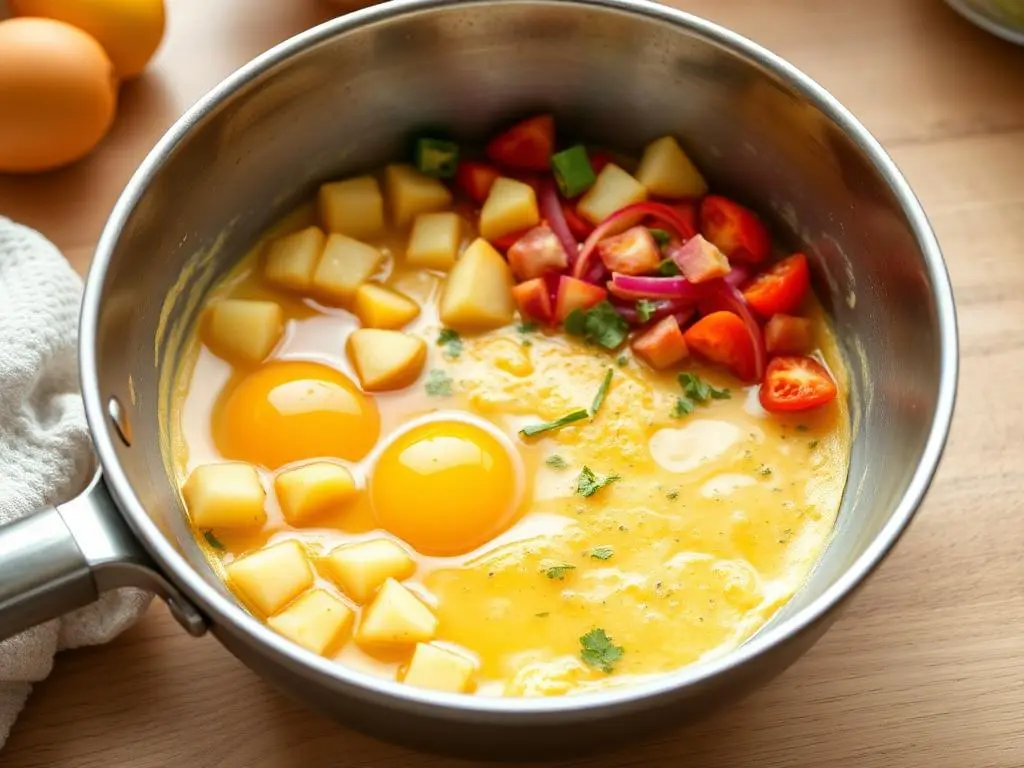When it comes to comfort food, few combinations are as beloved as potatoes and eggs. Whether you’re whipping up a hearty breakfast or a satisfying dinner, these two ingredients can create a delightful meal. But you might be wondering, “Can I eat potatoes with eggs?” This article dives deep into the nutritional benefits, culinary uses, and health considerations of this classic pairing. So, let’s get cracking!
Introduction
Overview of Potatoes and Eggs
Potatoes and eggs are staples in many kitchens around the world. They’re not just versatile; they’re also packed with nutrients. Potatoes, for instance, are rich in carbohydrates, fiber, and essential vitamins like Vitamin C and B6. They provide energy and can be a great source of dietary fiber, which is crucial for digestive health.
On the other hand, eggs are often hailed as a superfood. They’re loaded with high-quality protein, healthy fats, and a variety of vitamins and minerals, including Vitamin D and choline. This makes them an excellent choice for anyone looking to boost their nutrient intake.
Purpose of the Article
The purpose of this article is to explore the question, “Can I eat potatoes with eggs?” We’ll look at the nutritional profiles of both ingredients, their culinary uses, and any health considerations you should keep in mind. By the end, you’ll have a clearer understanding of how to enjoy this delicious duo while maximizing its health benefits.
So, whether you’re a seasoned chef or a kitchen novice, stick around as we uncover the delightful world of potatoes and eggs!
Nutritional Profile of Potatoes and Eggs
Potatoes: A Nutritional Breakdown
When you think of potatoes, you might picture a starchy side dish, but they offer much more than just carbs. A medium-sized potato (about 150 grams) contains approximately:
- 110 calories
- 26 grams of carbohydrates
- 2 grams of protein
- 0 grams of fat
- 2 grams of fiber
Potatoes are also a fantastic source of essential vitamins and minerals. They’re particularly high in Vitamin C, which supports your immune system, and potassium, which helps regulate blood pressure. Additionally, the fiber in potatoes can aid digestion and promote a feeling of fullness, making them a great option for those looking to manage their weight.
Different types of potatoes, such as russet, red, and sweet potatoes, each have unique nutritional profiles. For instance, sweet potatoes are higher in Vitamin A, while russets are known for their fluffy texture when baked. So, depending on your preference, you can choose the type that best suits your meal.
Eggs: A Nutritional Breakdown
Now, let’s crack into the nutritional benefits of eggs. A large egg (about 50 grams) contains roughly:
- 70 calories
- 6 grams of protein
- 5 grams of fat
- 0 grams of carbohydrates
Eggs are a powerhouse of nutrition. They provide all nine essential amino acids, making them a complete protein source. Additionally, eggs are rich in healthy fats, particularly monounsaturated and polyunsaturated fats, which are beneficial for heart health.
Moreover, eggs are packed with vitamins and minerals, including:
- Vitamin D: Important for bone health and immune function.
- Choline: Essential for brain health and development.
- Selenium: An antioxidant that helps protect your cells.
The versatility of eggs allows them to be prepared in numerous ways boiled, scrambled, poached, or fried making them a fantastic addition to any meal.
Health Benefits of Combining Potatoes and Eggs
Combining potatoes and eggs can create a balanced meal that offers a variety of nutrients. The carbohydrates from potatoes provide energy, while the protein from eggs helps with muscle repair and growth. This combination can be particularly beneficial for breakfast, as it can keep you feeling full and satisfied throughout the morning.
Moreover, the fiber in potatoes can help slow down the absorption of sugars, which may help stabilize blood sugar levels. This is especially important for those managing diabetes or looking to maintain steady energy levels throughout the day.
In summary, the nutritional profiles of potatoes and eggs complement each other beautifully. Together, they can form a delicious and nutritious meal that supports overall health. So, if you’ve been wondering, “Can I eat potatoes with eggs?” the answer is a resounding yes!
Culinary Uses of Potatoes and Eggs
Popular Dishes Featuring Potatoes and Eggs
When it comes to cooking, potatoes and eggs are a match made in culinary heaven. They can be combined in a variety of dishes that are not only delicious but also easy to prepare. Here are some popular options:
Breakfast Options
- Potato and Egg Hash: This hearty dish typically features diced potatoes sautéed until golden brown, then mixed with scrambled or fried eggs. You can add vegetables like bell peppers and onions for extra flavor and nutrition.
- Spanish Tortilla: A classic Spanish dish, the tortilla is made by layering thinly sliced potatoes and onions in a skillet, then pouring beaten eggs over the top. It’s cooked slowly until set and can be served warm or at room temperature.
- Egg and Potato Breakfast Burrito: For a quick and satisfying breakfast, wrap scrambled eggs and seasoned potatoes in a tortilla. Add salsa, cheese, or avocado for an extra kick!
Lunch and Dinner Ideas
- Potato Salad with Eggs: This refreshing dish combines boiled potatoes, hard-boiled eggs, and a tangy dressing. It’s perfect for picnics or as a side dish at barbecues.
- Shepherd’s Pie: A comforting classic, shepherd’s pie features a layer of seasoned ground meat topped with creamy mashed potatoes and sometimes includes eggs for added richness.
- Frittata: This Italian-style omelet can be loaded with potatoes, vegetables, and cheese. It’s baked in the oven and can be served hot or cold, making it a versatile option for any meal.
Cooking Techniques
The beauty of potatoes and eggs lies in their versatility, and there are numerous cooking techniques you can use to prepare them:
- Boiling: Perfect for making potato salad or hard-boiled eggs. Boiling is a simple method that retains the nutrients in both ingredients.
- Frying: Whether you’re making a crispy hash or frying eggs sunny-side up, this method adds a delightful texture and flavor.
- Baking: Baked potatoes are a classic, and you can also bake frittatas or casseroles that include both potatoes and eggs for a comforting meal.
- Roasting: Roasting potatoes brings out their natural sweetness and creates a crispy exterior. Pair them with roasted eggs for a unique twist.
Tips for Perfecting Potato and Egg Dishes
- Choose the Right Potatoes: Different types of potatoes work better for different dishes. For example, waxy potatoes are great for salads, while starchy potatoes are ideal for mashing.
- Don’t Overcook the Eggs: Overcooked eggs can become rubbery. Aim for a soft, creamy texture, especially in dishes like frittatas or scrambled eggs.
- Season Generously: Potatoes and eggs can be quite bland on their own, so don’t shy away from seasoning. Use herbs, spices, and condiments to elevate the flavors.

Health Considerations
Dietary Restrictions and Allergies
When it comes to enjoying potatoes and eggs, it’s essential to consider any dietary restrictions or allergies you may have. While both ingredients are generally safe for most people, there are a few things to keep in mind.
Gluten-Free Considerations
Potatoes are naturally gluten-free, making them an excellent choice for those with celiac disease or gluten sensitivity. You can enjoy them in various forms–mashed, baked, or fried–without worrying about gluten. However, be cautious with pre-packaged potato products, as they may contain gluten or be processed in facilities that handle gluten-containing foods.
Eggs are also gluten-free, so they can be safely included in a gluten-free diet. This makes the combination of potatoes and eggs a fantastic option for anyone looking to avoid gluten while still enjoying a hearty meal.
Egg Allergies and Alternatives
While eggs are a nutritious food, some individuals may have allergies or intolerances. If you’re allergic to eggs, there are several alternatives you can use in recipes that call for eggs. Some popular substitutes include:
- Flaxseed Meal: Mix one tablespoon of ground flaxseed with three tablespoons of water to replace one egg in baking.
- Chia Seeds: Similar to flaxseed, mix one tablespoon of chia seeds with three tablespoons of water and let it sit until it forms a gel-like consistency.
- Silken Tofu: Blend 1/4 cup of silken tofu until smooth to replace one egg in recipes.
These alternatives can help you enjoy the flavors of potatoes and eggs without compromising your dietary needs.
Weight Management
If you’re watching your weight, you might be curious about the caloric content of potatoes and eggs. While both ingredients can be part of a healthy diet, portion control is key.
- Caloric Content: A medium potato has about 110 calories, while a large egg contains around 70 calories. When combined, they can create a filling meal without excessive calories, especially if you focus on cooking methods like boiling or baking instead of frying.
- Portion Control: To manage your weight effectively, consider your portion sizes. A balanced meal might include one medium potato and one or two eggs, along with plenty of vegetables for added fiber and nutrients.
Glycemic Index and Blood Sugar Levels
Another important consideration when enjoying potatoes and eggs is their impact on blood sugar levels. Potatoes have a higher glycemic index (GI) compared to eggs, meaning they can cause a quicker spike in blood sugar. However, there are ways to enjoy this combination while keeping your blood sugar stable.
- Impact of Potatoes on Blood Sugar: The GI of potatoes can vary depending on the type and cooking method. For instance, boiled potatoes generally have a lower GI than fried or mashed potatoes. If you’re concerned about blood sugar, opt for boiling or roasting your potatoes instead of frying them.
- How Eggs Can Help Stabilize Blood Sugar: The protein and healthy fats in eggs can help slow down the absorption of carbohydrates, which may help stabilize blood sugar levels. Pairing eggs with potatoes can create a more balanced meal that keeps you feeling full longer and helps prevent blood sugar spikes.
Potatoes and eggs make a fantastic pairing, not just for breakfast but as a versatile foundation for many meals. They can be cooked together in countless ways whether in a classic potato hash or a creamy scrambled egg mixture. If you’re looking to explore other delicious combinations, you might want to check out how to cook a British cowboy steak for a hearty meal or learn more about the benefits of different ingredients like purple beans. Want something lighter? Try out a recipe for crispy nachos for a savory snack that pairs well with eggs!
FAQs
1. Can I Eat Potatoes and Eggs Together?
Absolutely! Potatoes and eggs make a fantastic combination. They not only complement each other in flavor but also provide a balanced meal rich in nutrients. Whether you’re preparing a breakfast hash or a savory frittata, this duo can be both delicious and satisfying.
2. Are Potatoes and Eggs Healthy?
Yes, both potatoes and eggs are healthy when consumed in moderation. Potatoes are a great source of carbohydrates, fiber, and essential vitamins, while eggs provide high-quality protein, healthy fats, and various nutrients. Together, they can create a well-rounded meal that supports overall health. Just be mindful of cooking methods and portion sizes to keep your meals balanced.
3. What Are the Best Ways to Cook Potatoes and Eggs?
There are numerous ways to cook potatoes and eggs, depending on your preferences. Here are some popular methods:
- Boiling: Great for making potato salad or hard-boiled eggs.
- Frying: Perfect for crispy potato hash or sunny-side-up eggs.
- Baking: Ideal for baked potatoes or frittatas.
- Roasting: Brings out the natural sweetness of potatoes and can be paired with roasted eggs.
Experiment with different cooking techniques to find your favorite way to enjoy this delicious combination!
4. Can I Eat Potatoes and Eggs Every Day?
While it’s perfectly fine to enjoy potatoes and eggs regularly, variety is key to a balanced diet. Eating them every day might lead to nutrient imbalances if you’re not incorporating other food groups. Aim to include a range of fruits, vegetables, whole grains, and proteins in your diet to ensure you’re getting a wide array of nutrients. If you love potatoes and eggs, consider rotating them with other healthy options to keep your meals interesting and nutritionally diverse.
5. Are There Any Health Risks Associated with Eating Potatoes and Eggs?
For most people, eating potatoes and eggs poses no significant health risks. However, there are a few considerations to keep in mind:
- Egg Allergies: Some individuals may have allergies to eggs, which can cause adverse reactions. If you suspect you have an egg allergy, consult with a healthcare professional for guidance.
- Potato Preparation: How you prepare potatoes can impact their healthiness. For instance, frying potatoes in unhealthy oils can add unnecessary calories and fats. Opt for healthier cooking methods like boiling, baking, or roasting.
- Blood Sugar Management: If you have diabetes or are concerned about blood sugar levels, be mindful of portion sizes and the type of potatoes you consume. Choosing lower-GI options and pairing them with protein (like eggs) can help manage blood sugar more effectively.
Conclusion
Summary of Key Points
Throughout this article, we’ve explored the delightful combination of potatoes and eggs. We’ve learned that both ingredients are not only versatile but also packed with nutrients. Potatoes provide essential carbohydrates, fiber, and vitamins, while eggs offer high-quality protein, healthy fats, and a range of vital nutrients. Together, they create a balanced meal that can be enjoyed in various forms, from breakfast hashes to savory frittatas.
We also discussed important health considerations, such as dietary restrictions, portion control, and the impact of these foods on blood sugar levels. By being mindful of how you prepare and consume potatoes and eggs, you can enjoy their benefits while maintaining a healthy diet.
In conclusion, if you’ve ever asked yourself, “Can I eat potatoes with eggs?” the answer is a definite yes! This classic pairing is not only delicious but also offers a wealth of nutritional benefits. So, don’t hesitate to experiment with different recipes and cooking methods to find your favorite way to enjoy this dynamic duo.
Whether you’re starting your day with a hearty breakfast or looking for a satisfying dinner option, potatoes and eggs can fit seamlessly into your meal plans. So grab your skillet, get creative in the kitchen, and savor the delightful flavors of this timeless combination!

